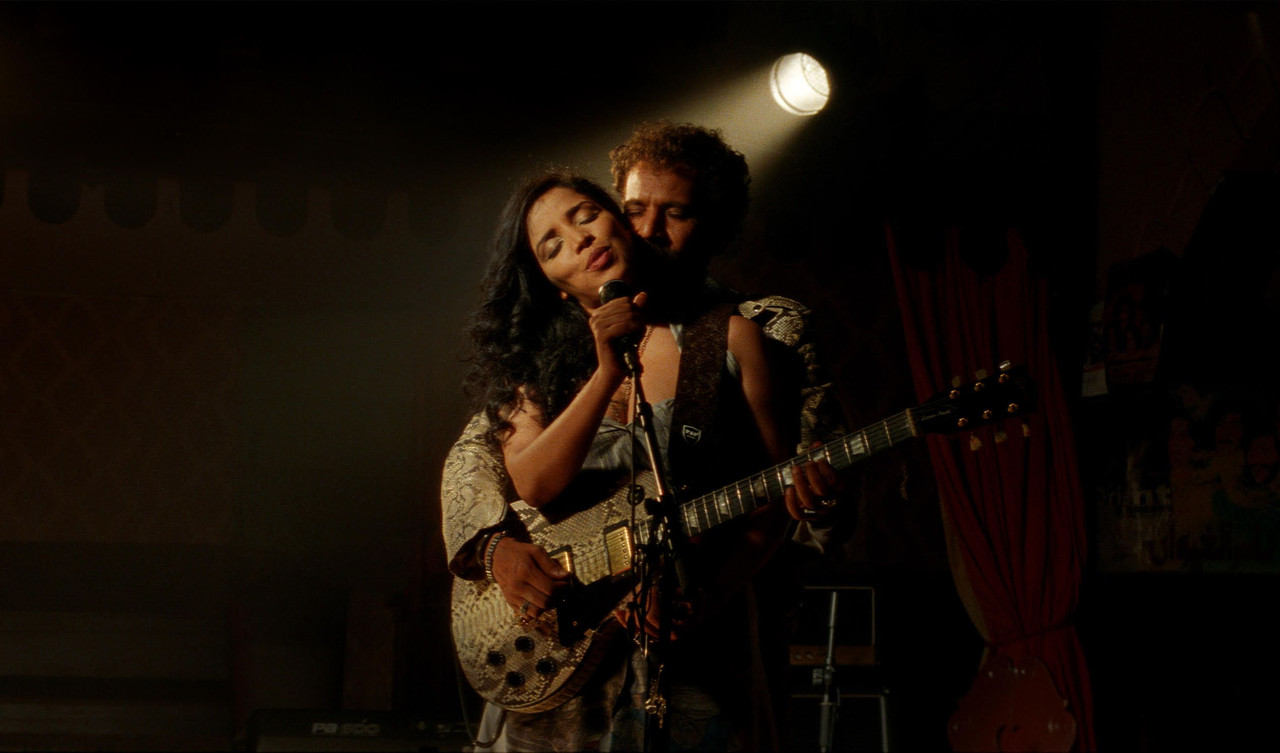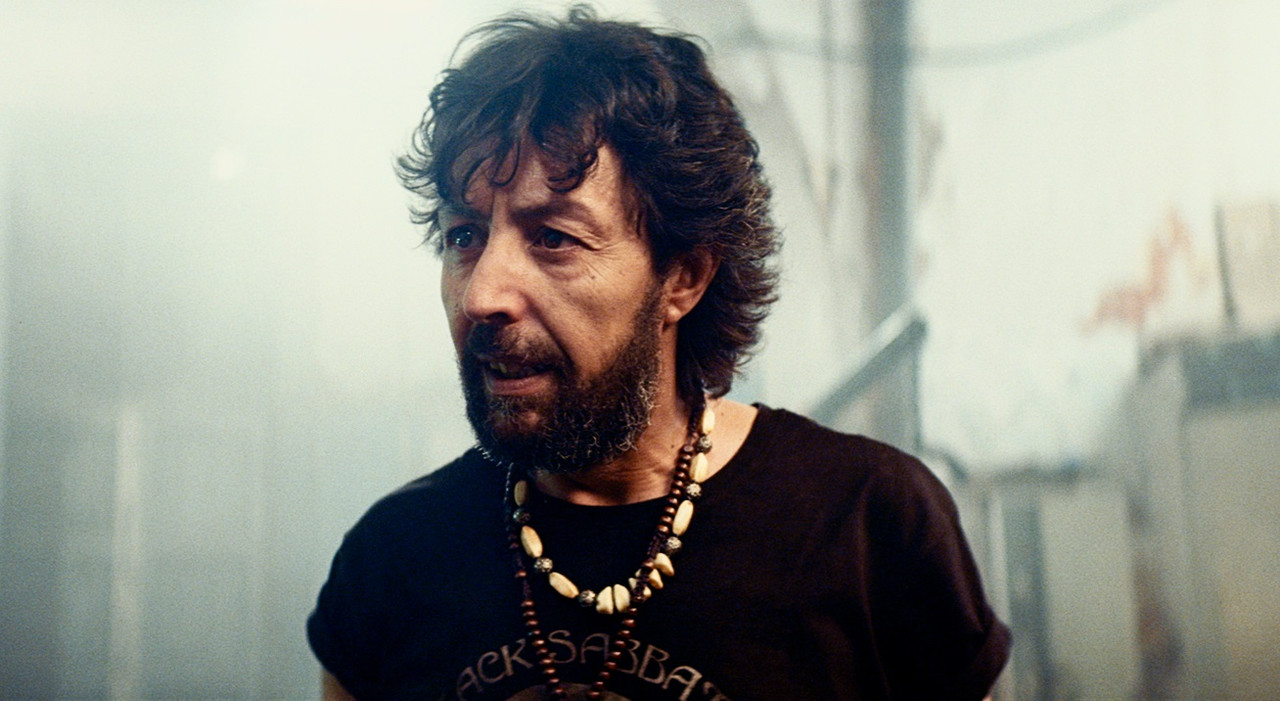Dir: Ismaël El Iraki
Energy pulses through Bataclan survivor Ismaël El Iraki's feature debut from the very start, as a rock cover of Man of Constant Sorrow takes us over the city of Casablanca to find a pissed off Rajae (Khansa Batma) storming out of a hotel and into a cab, making jokes with the driver until another car slams into them. A flashback throws us into a room where former rock star Larsen (Ahmed Hammoud) is tied to a chair and being menaced by a couple of British criminals who say he owes them £150,000. Making a deal, he's on a plane to Casablanca and, impersonating another passenger, into a limo... which crashes into Rajaes's car, introducing the two. What follows is a wild mix of genres and influences as Rajae and Larsen try to escape her pimp, Said (Said Bey) and Larsen tries to get Rajae to sing for him.
While the setting is immediately novel, there are definite echoes of other films and filmmakers in Zanka Contact. Perhaps most notable is Quentin Tarantino. Several story and structural points recall his work. In particular True Romance; the early scenes of Larsen and Rajae getting to know each other have echoes of Clarence and Alabama's early interactions and Said's conversation with an irritated client of Rajae's has some of the feel of Dennis Hopper's speech to Christopher Walken, with the same lingering threat of violence as he's speaking. That said, El Iraki doesn't slavishly imitate QT's style or even the sound of his dialogue, it's more that he's trying to capture a similar energy, and he does so successfully. There are other nods and winks throughout the film, obviously to the various versions of A Star is Born, but most notably the sequence when Larsen and Rajae, on the run, turn up to the house of another former member of Said's stable of girls. Here the film becomes a Western, complete with a violent shootout that is more than a little Peckinpah.
El Iraki injects plenty of style of his own. One moment shows a sawn-off shotgun being made, seen from below, it shows the butt and then the barrel dropping to the floor; an image that drips with menace as much as it does style. Striking dream sequences have both Larsen and Rajae seen with their eyes closed, stylized eyes painted on their lids, walking through a dream landscape, and there is a similar oneiric feel to the first time Larsen plays with Rajae, lifting his guitar over her, so she can feel the notes as she sings. Again though, it's all about the energy, be it the charge of the violent moments (Zanka Contact apparently means a street fight) or the powerfully quiet moment when Larsen relates the story of why he wears snakeskin all the time.
As well as El Iraki, the film's relentless forward motion is powered by charismatic performances from Khansa Batma, Achmed Mahmoud and Said Bey. Batma is well established as a musician in Morocco, but this is her first film role and from the moment she storms on to the screen, rubbing her lipstick off with the back of her hand, she has a presence commanding enough that you can see how she might shake Larsen out of his heroin haze. Her voice is beautiful and powerful, making the sequence near the end where she finally sings the song that gives the film its title impactful enough that you almost buy what happens as a result. Mahmoud's Larsen has more of a muted presence, not that the character can't be forceful, but there's a sense that part of this guy has gone missing; vanishing behind years of drugs and drifting from the music scene, again though, you believe the connection he has with Batma. The last of the central trio is Bey, initially a stereotypical pimp; charming his girls and their clients when he needs to, but also not to be messed with. Said Bey brings conviction to this, but also some more complexity when he's forced to help a much more vicious killer towards the end of the film.
Knowing the origins of Zanka Contact gives it an unexpected poignancy, drawing its leading character closer to his writer and director. There is a throughline here of using music as a way to hold on in a chaotic place. Larsen's connection to music has been compromised; heroin addiction has robbed him of his singing voice, because he's been injecting in his neck for so long. He hasn't recorded in years and has signed away the rights to his biggest hit, but he still carries his snakeskin Gibson and wears the similarly styled jacket and boots that were his onstage trademark. The connection back to music when he hears Rajae sing is immediate and visceral. It feels like El Iraki expressing what he says a gig by the German band Kadavar (who appear in the film), just a few days after the Bataclan, did for him "They brought me back from the dead". Resurrection is perhaps a slower process for Larsen, but it begins in that moment that seems to awaken him somewhat from his withdrawal-induced fug.
It's not a perfect film. The ending feels a little too neat, as does the apparent ease with which Larsen, who has a decades long habit, seems to shrug off heroin use, and it does sometimes lean a touch heavily on its influences, but Zanka Contact grabs us from the beginning and drags us along on its ride for two pretty relentless hours. It's a debut that commands the attention
★★★★



No comments:
Post a Comment